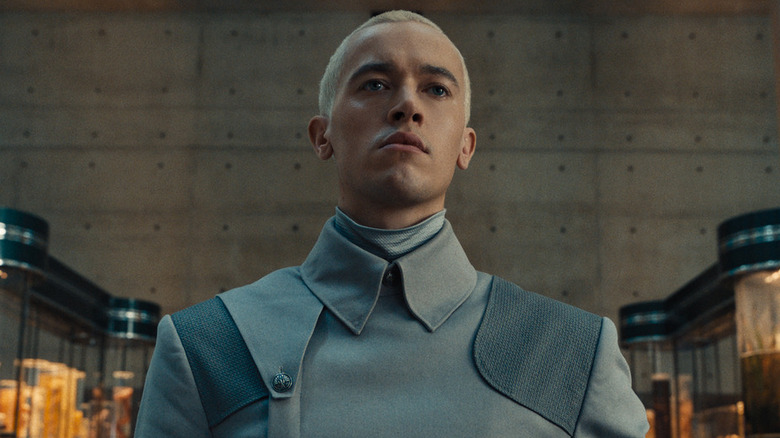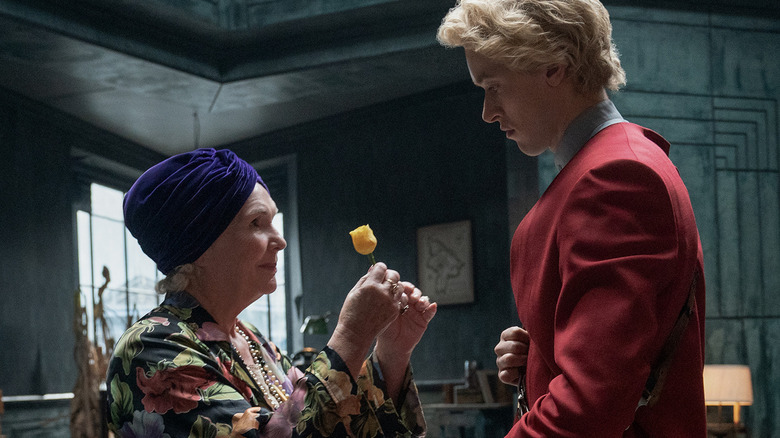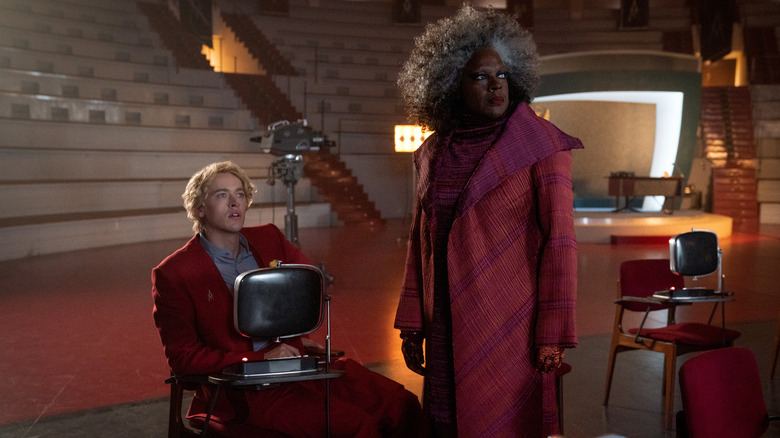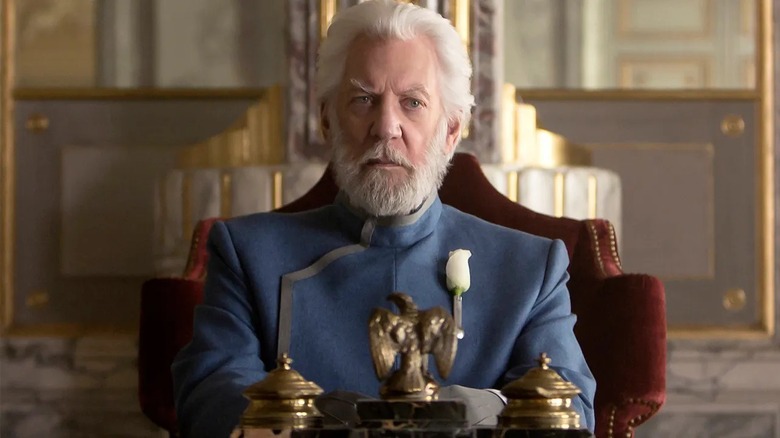President Snow's Entire Hunger Games Backstory Explained
"The Hunger Games," both the bestselling book series by Suzanne Collins and the blockbuster film franchise, is a dystopian saga of cruelty and injustice. In the future, the United States has transformed into Panem, a fascist state ruled by a totalitarian government in the well-appointed Capitol, which oversees 12 distinct districts. Each year, every area sends two of its children to fight to the death. It's a punishment for past uprisings, a deterrent for future ones, and entertainment for the masses, and it's where our hero, the bowhunting Katniss Everdeen, finds herself during the 74th Hunger Games.
But who's the one behind all this murder? Who's calling the shots in this depraved dictatorship? Well, the answer is Coriolanus Snow, who rules with an iron fist and unbelievable cruelty. But how did Snow get to be in this position of power, and how did he rid himself of his humanity? Well, the tale of President Snow is a fascinating story, one told via little bits throughout "The Hunger Games," as well as in the Snow-focused prequel novel "The Ballad of Songbirds and Snakes," which was adapted for the big screen in 2023. If you want to know more about this cold-blooded tyrant, then keep reading for President Snow's entire "Hunger Games" backstory explained.
President Snow grew up during a massive civil war
The first part of "The Ballad of Songbirds and Snakes" concerns the preparation and production of the tenth annual Hunger Games. This yearly murderfest is punishment to Panem's 12 districts for daring to rise up against an oppressive government regime, one that barely kept its people alive while allowing Capitol citizens and assorted barons of industry to live in luxury. And as the tenth annual Hunger Games, it marks a decade since the end of that devastating civil war.
Coriolanus Snow is 18 during the prequel novel, meaning the conflict ended when he was 8 years old. In one passage, there's a passing reference to how Snow and his classmates were around 2 years old at the start of the war, meaning their lives of luxury and privilege were interrupted for a period of about six years.
Snow's father was Crassus Snow, a high-ranking military general who spent most of his time away from his family in the Capitol and died in the war when he was shot by a rebel sniper. However, it's a little different in the film version of "Songbirds and Snakes." Here, Crassus is the victim of a rebel trap in the woods near District 12, and Coriolanus learns of his father's fate from his grandmother rather than a Peacekeeper. Snow's mother also died during the war while giving birth to a baby girl who, you guessed it, also didn't survive. So yeah, saying that Snow had a rough childhood is a bit of an understatement.
He was raised by his grandmother in the Capitol
Due to the death of both of his parents during the Panem Civil War, Coriolanus Snow — known by the childhood nickname "Coryo" at the time — found himself under the care of his grandmother. Bound to the Capitol's culture of pomp, aggrandizement, and overall fanciness at the expense of emotional warmth, she demanded that Coryo call her "the Grandma'am." The wealthy matriarch of the long-established and highly respected Snow family was a hard-line supporter of the tough Capitol government, and by the time Coryo was nearly an adult, he shared her opinions because she had drilled them into his brain. She proudly sang the Capitol anthem, "Gem of Panem," with fervor, and she frequently badmouthed rebels — meaning anyone from the Districts — as well as servants and other prominent families that she thought of as being not as important as hers.
Snow spent the rest of his childhood with the Grandma'am (and his cousin, Tigris, a generous stylist) up until his high school graduation, and he went back to her upon his return from Peacekeeper training. As for where he hung his proverbial hat, the future president lived with his relatives in the Snow family ancestral home, a penthouse apartment in one of Panem's tallest buildings. It was once very impressive, but it fell into disrepair during the war and the reconstruction period. Like so many others in Panem during this time of hardship, the Snow family struggled for food, subsisting for years on cheap foodstuffs like lima beans, oatmeal, and potatoes.
The reason for all the roses
According to "The Ballad of Songbirds and Snakes," during and after the war, Capitol residents were forced to endure a life without some of the many luxuries to which they'd become accustomed and entitled to, including high-quality clothes, expensive meat, and flowers. Such things were extravagances and were hard to come by, except in the Snow household, where the Grandma'am grew her own flowers, utilizing the rooftop garden adjacent to the family's penthouse digs. She didn't have many and could only manage to ever bring a handful to full flower at any given time, but during the prequel novel, she carefully, if reluctantly, doles out a few to Coriolanus Snow to liven up his outfits for events pertaining to the Hunger Games and his studies at the Academy.
In part because of familial and sentimental attachments, roses became a personal trademark of Coriolanus Snow in his adulthood. He tended to a personal garden and was rarely seen without a rose on his lapel. According to Hunger Games victor-turned-rebel Finnick Odair, Snow dispatched those he feared would turn on him by slipping them poison. So as not to arouse suspicion, Snow also consumed the poison around his potential enemies, and while he took an antidote in time, the practice left him with mouth sores that made the man constantly smell like blood. The roses he wore were genetically enhanced to have a powerful smell that covered up that spooky, sanguine scent.
President Snow loved someone a lot like Katniss Everdeen
The Snow clan is among the more prominent and famous families of the Capitol, full of famous members since way back in the history of Panem. In "The Ballad of Songbirds and Snakes," it's revealed that the bloodline even has its own unofficial and subtly cutthroat motto: "Snow lands on top." Teenage Coriolanus Snow was therefore entitled to many privileges he considered to be his birthright, such as attending an elite Capitol school known only as the Academy. Even among an already rarified student body, Snow was the best of the best, earning top marks, and he was selected for a program introduced with the tenth Hunger Games, wherein Academy students would be assigned as mentors to each of the 24 forced Hunger Games participants — or "tributes" — from around Panem.
His tribute assignment was a 16-year-old named Lucy Gray Baird of District 12, the sector known for its coal mining and poverty. Resentful at first, Snow was motivated to help the plucky, Katniss-esque Lucy Gray win, in part because the winning mentor would receive a full college scholarship, something the broke Snow family could really use. But then he fell in love with Lucy Gray, an enigmatic and charming young woman who captivated Panem by singing old folk songs whenever she was paraded around in pre-Games events. Lucy Gray was Snow's first love but not his first encounter with a woman — the prequel novel implies that he once attempted something physical after being dared by his friend, Festus.
He cheated in the Hunger Games
As a mentor, the 18-year-old Coriolanus Snow watched the tenth annual Hunger Games remotely, from a luxury box at his school with the other mentors. Not yet held in a specially created arena with all sorts of special effects, the tributes ran around a bombed-out stadium, hiding where they could. Snow momentarily participated in these Hunger Games, as it were, when his friend and fellow mentor, Sejanus Plinth, snuck into the in-progress death battle to retrieve the body of his assigned tribute, Marcus, a teenager he knew from his early childhood days when he lived in District 2. Dr. Gaul, one of the Games' more sadistic architects and overseers, forced Snow into the arena to get Sejanus out, during which time he was attacked by a tribute named Bobbin. Snow had no choice but to kill Bobbin in self-defense, beating him to death with a board.
Coryo safely got out of the arena, and so did his tribute and true love, Lucy Gray. She's the last tribute standing ... but not without some help from Snow. While looking for Dr. Gaul on an unrelated matter one day, he came across a tank full of vicious, mutated snakes set to be used to attack the tributes. Snow knew that they wouldn't attack Lucy Gray if they knew her scent, so he slipped a handkerchief she'd used into the tank. When those snakes hit the arena and killed several tributes, sure enough, they left Lucy Gray alone. In the film version of "The Ballad of Songbirds and Snakes," Snow actually went one step further by sneaking into the arena on the eve of the Games and locating some underground tunnels for Lucy Gray to take shelter in.
President Snow didn't keep the peace as a Peacekeeper
While he won the Hunger Games, Coriolanus Snow didn't get to claim a scholarship and a place at the university in the fall. Instead, he was confronted by Academy dean Casca Highbottom with evidence of his cheating. To spare his family embarrassment (and Snow some horrific punishment), he was allowed to enlist as a Peacekeeper, Panem's paramilitary police force. Snow asked to train at the facility in District 12, hoping to be close to Lucy Gray Baird, whom he tracked down when she was performing with her makeshift family of traveling musicians.
He quickly settled into a routine of training all week, then going to see Lucy Gray and her family perform haunting folk songs on Saturday night (including "The Hanging Tree," which Katniss Everdeen would sing as a protest anthem 70 years later). He had almost accepted his future as a Peacekeeper with Lucy Gray by his side when fellow disgraced Capitol boy-turned-Peacekeeper Sejanus started to help locals plan a revolt and escape the district. Among those rebels was Lucy Gray's ex-boyfriend, Billy Taupe, of whom Snow couldn't shake his overwhelming jealousy.
The plan went wrong when Billy Taupe's new flame, Mayfair, the mayor's daughter, overheard their plot to escape and leave District 12 — and Snow shot and killed her. Another rebel, Spruce, gunned Billy down, and Spruce himself died after he was arrested, having been badly beaten. Sejanus got caught, too, and he was hanged for his crimes, which Snow reported to Capitol authorities. In the film version of "The Ballad of Songbirds and Snakes," Spruce gets executed at the same time as Sejanus rather than dying of his injuries.
He helped transform the Hunger Games
Coriolanus Snow made plans to escape Panem with Lucy Gray, only to learn that he had been accepted into Peacekeeper officer training, which meant a way back into the Snows' old life of Capitol elitism. However, he decided to abscond with her anyway, but after accidentally confessing that he was responsible for Sejanus' death, Lucy Gray left him in the woods, never to be seen again. Snow then realized that he was a Capitol man at heart and hopped on a train for officer school. To his surprise, he got dropped off at the Capitol, where he learned that Dr. Gaul had summoned him to study under her at the University.
It turned out that Peacekeeper training had been a set-up, merely a way for Snow to learn about District people. At Dr. Gaul's behest, Snow went on to work as a gamemaker, as he had shown aptitude for the profession as a student mentor: Sending food via drone to tributes had been his idea, as was setting odds on the competitors. As an apprentice gamemaker, Snow introduced the idea of the Victors' Village, a luxurious area of homes in each district where Hunger Games winners would live. Meanwhile, Sejanus Plinth's grieving father, unaware of Snow's snitching, made young Coryo his heir, returning the Snow family to a position of wealth.
Snow poisoned his way to the top and ruled with an iron fist
Thanks to his new riches, his inventive ideas for the increasingly popular Hunger Games, and his penchant for poisoning his political rivals, Coriolanus Snow rose to the top of the pile in Panem, eventually becoming the president. It's not surprising that a cutthroat, calculating, a careerist man like Snow became the most powerful person in the Capitol, and it's even less shocking that he used underhanded tactics to maintain his grip on power. Once he ascended to the presidency, Snow became a brutal and tyrannical dictator. His administration oversaw an increased military presence in all the districts, along with a more pronounced role for his beloved Hunger Games, all to keep the citizenry in line.
Snow was also very quick to murder the families of his enemies and anyone who made the government or the Capitol appear weak or foolish. Take, for example, Haymitch Abernathy, Katniss Everdeen's mentor and winner of the 50th Hunger Games. He emerged as a victor after manipulating his arena's force field. For showcasing a flaw in the game, Snow had Haymitch's family and girlfriend killed. And after Johanna Mason won the 71st Hunger Games and subsequently refused to become a poster girl for the Games, her family met the same fate as Haymitch's. In short, President Snow's rise to power was full of tragedy and deception, and once he reached the top, he unleashed all his darkness on the people of Panem.








